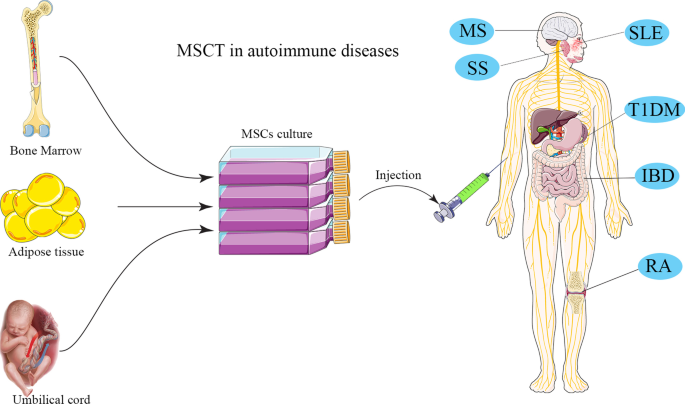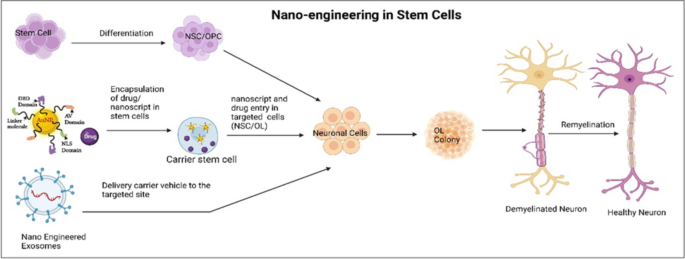7 Simple Techniques For Regenerative Medicine For Multiple Sclerosis
Table of ContentsEverything about Regenerative Medicine For Multiple SclerosisThings about Regenerative Medicine For Multiple SclerosisGetting My Regenerative Medicine For Multiple Sclerosis To Work5 Simple Techniques For Regenerative Medicine For Multiple SclerosisThe Only Guide for Regenerative Medicine For Multiple SclerosisSome Known Details About Regenerative Medicine For Multiple Sclerosis Little Known Facts About Regenerative Medicine For Multiple Sclerosis.
The mesenchymal stem cells hair transplanted during stem cell treatment can separate and develop to create brand-new cells that can replace the damaged cells of the worried tissue. This might bring back neurological functions in people with this condition. These advantages of stem cell therapy are more supported by the ability of MSCs to advertise recovery.People with numerous sclerosis are usually treated with mesenchymal stem cells. These are multipotent stem cells that have the capability to distinguish and develop to develop a vast range of cell enters the body. As soon as hair transplanted, these stem cells can develop to create healthy nerve cells thus sustaining the regrowth of the broken cells of the nerves.
When hair transplanted, the stem cells migrate to areas of inflammation or damage within the central nerve system (CNS). They are normally brought in to the sites of injury where the immune system is assaulting the myelin sheath, the safety treatment of nerve fibers. The stem cells function by advertising the repair service and regrowth of damaged myelin, potentially bring back feature to impacted afferent neuron.
Regenerative Medicine For Multiple Sclerosis Things To Know Before You Get This
Stem Cell Study on MS The National Multiple Sclerosis Culture, together with various other organizations, is actively moneying and sustaining research right into mesenchymal stem cell treatment for numerous sclerosis to explore their potential and boost treatment methods. The goal is to develop safer and a lot more effective methods to utilize stem cells in dealing with MS.
Below are reviews from individuals of the Swiss Medica clinic. The patient took a trip from England seeking relief from his MS signs and symptoms, a condition he has actually fought because 2006. For many years, he has fought with exhaustion, wheelchair problems, and problems with his bladder and digestive tract, all coming from nerve damage.
His treatment experience was smooth. He additionally appreciated that his travel, accommodations, and vegan nutritional preferences were thoughtfully organized. "The clinical personnel were impressive, particularly the medical professional. Every little thing was plainly described, and they were extensive in their checks. I would definitely suggest this area." The individual took a trip from Romania looking for therapy for MS after listening to positive feedback concerning stem cell therapy for the illness.
Obtain a cost-free online examination to learn how stem cells will certainly benefit your instance, and what are the duration and expense of the therapy. Medical Expert, Swiss Medica doctor Lemus, H. N., Warrington, A. E., & Rodriguez, M. (2018 ). Numerous Sclerosis: Systems of Illness and Approaches for Myelin and Axonal Repair Service.
The smart Trick of Regenerative Medicine For Multiple Sclerosis That Nobody is Talking About

Stem cells are cells in the body that can develop into specialized cells that serve a specific feature. They are additionally able to create specific duplicates of themselves. There are two main kinds of stem cells: beginning stem cells and grown-up stem cells. are located in the developing embryo and can grow into most sorts of cells in the body.
are found in some grown-up cells and organs including the bone marrow, skin, blood, and brain. Adult stem cells are not as flexible as beginning stem cells and are consequently a lot more minimal in regards to the kinds of cells they develop into. The unique properties of stem cells offer promise for new therapies that can slow/halt MS illness task and repair tissue damages in the main nerves.
Regenerative Medicine For Multiple Sclerosis - An Overview

The procedure involves accumulating stem cells from a person's very own (autologous) bone marrow. The individual is after that treated with radiation treatment use this link to deplete the body immune system and stem cells are reestablished into the body where they mature right into new, healthy and balanced immune cells - Regenerative Medicine for Multiple Sclerosis. Stem cells can be infused right into the body in various methods

In 2000, the MS Culture of Canada and MS Scientific Study Structure moneyed a clinical trial entailing HSC transplants, led by Drs. Mark Freedman and Harry Atkins from the Ottawa Hospital Research Institute/University of Ottawa. The aHSC treatment readily available in Canada is a treatment that uses high-dose radiation treatment, additionally called conditioning.

The smart Trick of Regenerative Medicine For Multiple Sclerosis That Nobody is Discussing
Neural stem cells (NSC) are found in the brain and can mature into various kinds of brain cells consisting of neurons, oligodendrocytes, and astrocytes. NSCs may serve to repair or shield the mind and regulate the immune system. Early clinical trials in non-human primates demonstrated that treatment with NSCs benefitted the progression of MS-like disease in pet versions.
The results from these safety research studies are favorable for future stem cell and regenerative medication treatments in MS. Future clinical tests (stage 2 and 3) with bigger varieties of individuals and controls are essential to analyze the efficiency of this treatment for MS. As shown by the instances above, there is a large range of research study taking location that will certainly supply additional responses regarding the use of stem cells to deal with MS.
Stem cell therapy is thought about risk-free, but, like any type of medical procedure, it brings some risks, such as momentary swelling or pain at the shot site. Nonetheless, major adverse effects are rare when done by qualified specialists.
Regenerative Medicine For Multiple Sclerosis for Beginners
Multiple sclerosis (MS) is a chronic condition of the central nerves that influences the mind and spine. It is characterized by the deterioration of myelin, a compound that covers nerve fibers, causing disruptions in interaction in between the brain and the remainder of the body. Signs and symptoms can vary extensively and include muscle weak point, vision issues, discrepancy, and fatigue.
Multiple sclerosis is defined by the body immune system wrongly assaulting the protective sheath (myelin) that covers nerve fibers, causing communication issues in between the mind et cetera of the body. The illness Visit Website can result in the wear and tear or long-term damage of nerves. Signs differ extensively among patients and can include tiredness, movement problems, pain, and cognitive adjustments.